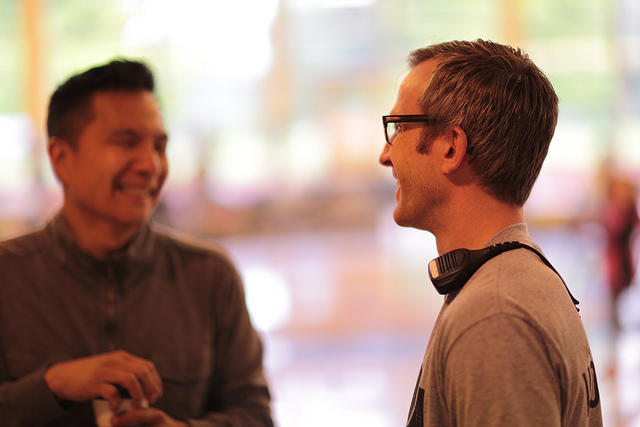blog
Some of my coaching clients have difficulty keeping their balance in their organisational cultures – as though they’re struggling to stand upright in the current of a stream. This is typically when in some way they’re not aligned with the values or behaviours that surround them: their difficulty lies in being different (which may be why they were recruited in the first place: to bring in fresh blood). And yet it could be career-threatening for them to speak their truth.
I can find myself watching a client become increasingly stressed in an environment which appears unlikely to change. Exploring belonging and enabling compassion, while I stand back in a deeply-connected way, offer a way forward.
My article ‘In the swim of things’ is published in Coaching at Work. If you’re a subscriber, access it here or contact me at lw@lindsaywittenberg.co.uk for a pdf
Photo by Aaron Hawkins via Compfight
In the swim of things: my latest article in Coaching at Work
Some of my coaching clients have difficulty staying upright in the stream of their organisational cultures, especially when they aren't aligned with the values or behaviours in those cultures: their difficulty lies in being different, even though that may be exactly why they were recruited in the first place. This can cause significant stress.
Read more »Stress, relationships and business results
Line managers can unwittingly create damaging stress in the relationships they have with their reports. This can come from their modelling themselves against others whose values they don't share - and once they allow themselves to be their authentic selves their working relationships can be transformed. Systemic coaching blended with comfort working with mental health issues can resource the client in valuable ways.
Read more »Leadership in professional service firms
Leadership is particularly complex and demanding in professional service firms such as law and accountancy. In such firms not only is profit generated through each fee-earner's billable hours, but the distribution and clarity of power is less clear, more diffuse and less demarcated than in other organisations. Leadership is an ambiguous matter of high autonomy and yet often high consensus.
Read more »Do you know when to stop? My latest article in Coaching at Work
When is coaching actually performance management? My reflection column in the May issue of Coaching at Work explores my experience that there’s no clear, constant, easily-definable line between the two.
Read more »A Bigger Conversation
Relationships - between people, and between people and events, behaviours, beliefs, cultures and outputs - are the key to organisational health. Sometimes skilled, capable and experienced leaders don't seem fully able to occupy their authority, sometimes the same challenge seems to recur repeatedly. Such challenges may require a Bigger Conversation: a conversation that addresses not just individuals or individual issues, but which sees them as an ecosystem.
Read more »Influence, impact and culture change: a systemic view
When a new broom comes in to a senior role with high expectations, but is inexplicably unable to occupy their authority, the situation can benefit from a systemic constellations perspective. This means looking at what might have been ignored in the organisation’s remembering, what or who might have been excluded or unacknowledged - and especially what might not have been acknowledged about the contribution of a previous occupant of the role. Energy is then released and the leader is freed up to do what they do best.
Read more »Letting go of knowing: new article in 'Coaching at Work'
Clients and potential clients respond with more energy to their experience of how I am than to what I know - and equally, who I am, and how my ‘being’ shows up, have a significantly greater impact on my coaching than what I do.
Read more »Compassionate leadership
Compassion at work increases our willingness to trust: our brains respond more positively to bosses who have shown us empathy – and compassion increases the health and wellbeing not only of employees but also of the bottom line. When compassion is low, engagement and levels of discretionary effort are low, retention and recruitment are more difficult, stress and absenteeism are high, and success becomes more elusive.
Read more »Nourish Your Practice: new article in Coaching at Work
My article 'Nourish Your Practice' has been published in Coaching at Work January 2017. My reflection before and after every coaching session is an intrinsic part of any coaching that I deliver: without it I would be simply skimming across the surface of what is actually going on and what the possibilities for change could be. I encourage my clients to reflect too.
Read more »Practitioner in Systemic Coaching and Facilitation
I've achieved the Practitioner Certificate in Systemic Coaching and Facilitation. My use of constellations - which are a key part of this work - facilitates clients' growth through my coaching. The approach illuminates the hidden dynamics in relationships, teams and organisations, clarifies what may be puzzling or unclear or difficult, and enables change to happen at a level beyond only behaviour management or leadership models.
Read more »











